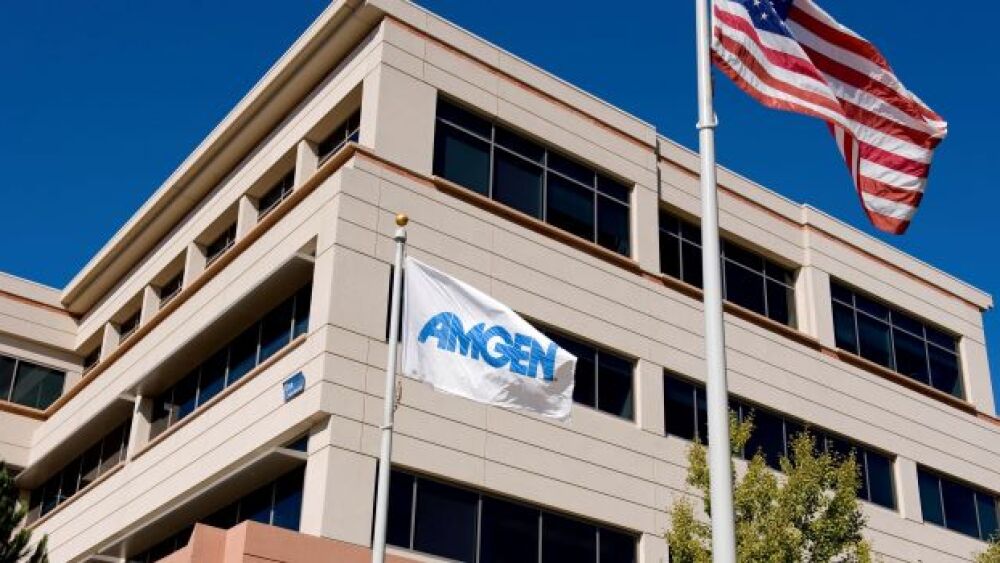The Federal Trade Commission filed a lawsuit Tuesday seeking an injunction to prevent Amgen’s buyout of Horizon Therapeutics, which the agency says would “entrench monopoly drugs.”
Pictured: Amgen headquarters building with flags/Courtesy of Amgen
Amgen and Horizon Therapeutics are gearing up for a fight after the Federal Trade Commission sued Tuesday to block the California-based biopharma giant from closing a $27.8 billion deal to acquire Ireland-based Horizon.
At issue for the FTC are two Horizon drugs: Tepezza, which is approved to treat moderate to severe thyroid eye disease, and Krystexxa, a chronic gout therapy. Tepezza brings in nearly $2 billion in sales per year, while sales of Krystexxa are growing rapidly, according to STAT News.
In a statement issued Tuesday, the FTC said the deal would enable Amgen to leverage its portfolio of blockbuster drugs to “entrench the monopoly positions” of these two medicines by using rebates on its existing drugs to pressure insurance companies and pharmacy benefit managers into “favoring” Krystexxa and Tepezza.
“Rampant consolidation in the pharmaceutical industry has given powerful companies a pass to exorbitantly hike prescription drug prices, deny patients access to more affordable generics, and hamstring innovation in life-saving markets,” FTC Bureau of Competition Director Holly Vedova said in the same statement. Vedova added that Tuesday’s action is “the FTC’s first challenge to a pharmaceutical merger in recent memory.”
The lawsuit, filed under seal in Illinois federal court where Horizon’s U.S. headquarters is located, seeks an injunction to prevent the deal from closing while the FTC conducts an in-house trial.
In a prepared statement, Amgen said it is disappointed by the FTC’s decision and remains committed to completing the acquisition, which the company contends “will bring significant benefits to patients suffering from very serious rare diseases in the U.S. and around the world.”
Amgen stated that the medicines offered by the two companies generally treat different diseases and patient populations and emphasized that “there are no overlaps of competitive concern.”
Horizon also responded to the FTC’s announcement, saying in a statement that the complaint “is rooted in a theory about potential future ‘bundled’ contracts with payors and not competitive overlap concerns.”
“Horizon does not and has no plans to bundle any of its rare disease medicines,” company representatives stated.
Amgen echoed this sentiment, saying, “FTC’s claim that Amgen might ‘bundle’ these medicines (offer a multi-product discount) at some point in the future is entirely speculative and does not reflect the real-world competitive dynamics behind providing rare-disease medicines to patients.” The larger pharma said it has committed to not bundle the medicines at issue.
In a statement sent to BioSpace, Lee Brown, global sector lead for Healthcare at global research firm Third Bridge said that “in light of Horizon’s bright future as a stand-alone company, the FTC’s challenge appears overly zealous.
“It is clear that Horizon’s leading drugs were widely accepted by the market and embraced by patients and physicians alike. As such, the FTC’s rationale that consolidation in the pharma industry has resulted in exorbitantly high prescription drug prices and declining patient access appears unjustly attributed in this particular transaction when considering the positive effects of an Amgen-Horizon merger,” Brown said.
Amgen announced its intention to acquire Horizon in December 2022. In biopharma’s biggest deal of 2022, the Thousand Oaks-based company committed to paying $116.50 for each share of Horizon.
Amgen beat out Sanofi and J&J subsidiary Janssen for Horizon’s portfolio, which also includes Uplizna, an anti-AQP4 antibody approved to treat neuromyelitis optica spectrum disorder, a rare neuroinflammatory autoimmune disease.
Shares of Horizon fell 15% following the FTC’s announcement.
Heather McKenzie is a senior editor at BioSpace, focusing on neuroscience, oncology and gene therapy. You can reach her at heather.mckenzie@biospace.com. Follow her on LinkedIn and Twitter: @chicat08
Editor’s Note (May 17): This story was updated from the original to include comments from Lee Brown, global sector lead for Healthcare at global research firm Third Bridge.






